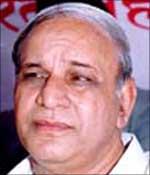|
|
| Help | |
| You are here: Rediff Home » India » News » Report |
|
 | ||||||
| Related Articles | ||||||
|
•
Mother thinks Kanshi is Mayawati's prisoner
| ||||||
| |||||||||||||||||||||||
|
| |||||||||||||||||||||||
Last Updated: October 09, 2006 23:31 IST
Bahujan Samaj Party founder Kanshi Ram died in New Delhi early on Monday due to complications arising out of multiple ailments he had been suffering for quite some time.
Kanshi Ram, a bachelor, was an enigma in Indian politics, and some considered him to be the true inheritor to B R Ambedkar's political legacy.
Here is a primer on how Kanshi was responsible for pitchforking Dalits to the centre of Uttar Pradesh politics, leading to the decline of national parties like Congress:
Who is Kanshi Ram?
Kanshi Ram was born in 1934 in a community of Punjabi Chamars.
He was given a reserved position in the Survey of India after completing his BSc degree, and in 1958 he transferred to the Department of Defence Production as a scientific assistant in a munitions factory in Poona.
He was slowly sucked into activism as he stood up for those who were denied their rightful place in the government set up.
He then launched a political party espousing the Dalit cause and capitalized on the Congresss slump in Utttar Pradesh.
How did he enter politics?
Kanshi first launched an organisation for protecting the interests of Dalit workers in government organisations in 1978.
He later floated a political forum -- Dalit Shoshit Sangharsh Samiti -- in 1981.
Kanshi soon announced at that time that he was no longer willing to work for any organisation other than the Bahujana Samaj Party. His transition from social worker to politician was complete.
How did he fare in politics?
But by 1989 the Bahujana Samaj Party had put in five years of solid organising work in UP and neighbouring states like Madhya Pradesh, Punjab, Delhi, and parts of Haryana.
He tested political waters by entering the fray in 1987 in a Lok Sabha by-election against V P Singh in Allahabad when the latter founded Jan Morcha, but failed to make it to Parliament.
However, he later won from Etawah, Uttar Pradesh, in 1991 and entered the Lok Sabha.
Though his party managed to secure a good chunk of the votes, they were not translated into seats, at least in the first four elections that it faced till 1991.
In the next election, Kanshi stuck and alliance with Mulayam Singh Yadav. The BSP won 67 seats, the Samajwadi Party won 109 seats, making it second to the BJP with its 177 seats and 33.3 per cent of the vote.
The Samajwadi Party and the Bahujana Samaj Party were able to form a coalition Government, with Mulayam Singh as chief minister.
But in June 1995 Kanshi Ram and Mayawati brought the government down.
He always gave importance to the acquisition of administrative power.
He formed a new government with the support of the Manuwadi BJP, putting Mayawati in the forefront.
In the next elections too the BSP put up a similar show and there was a stalemate in the state. This time around, it was decided that the BSP and the BJP will share power. Mayawati would serve as chief minister for six months and then give way to Kalyan Singh from the BJP for the same period. After Mayawati's stint, things degenerated for the BSP and soon the Kanshi Ram era, at least in the active sense, will come to an end.
Why did he disappear from the scene all of a sudden?
Kanshi handed over the party reigns to Mayawati in 2001.
He soon developed multiple ailments like stroke, diabetes and hypertension and was virtually bed-ridden at Mayawati's residence.
What is the problem between his family and Mayawati?
His family members alleged that Mayawati was holding him captive so as to control the BSP.
Kanshi's mother, 90-year-old Bishan Kaur, approached the Supreme Court in 2005 alleging that his family members were not allowed to meet him.
She expressed doubts over the kind of treatment being provided to Kanshi under Mayawati's care.
Accepting Kaur's plea, the apex court directed the All India Institute of Medical Sciences to constitute a team of doctors to examine Kanshi's physical and mental condition and to find out whether he needed to be admitted to a hospital.
Even after his death on late Sunday night, his family approached the courts, pleading that a post mortem be conducted before his cremation.
The courts declined to entertain their plea and he was cremated on Monday.
Did he have a unique take on reservations?
Kanshi Ram was extremely critical of the institution of reservation in government employment. Reservation is a 'crutch' -- useful for a cripple, but a positive handicap for someone who wants to run on his own two feet. Citing the high number of Scheduled Castes and Tribes in the civil services, he also said reservations have served their purpose for the SCs and STs and that the backward class people must also be given a share.
What does his death mean to the BSP?
As the BSP braces itself to face its first big election without Kanshi Ram, insiders and BSP protagonists strongly feel that the party patriarch's end will lead to a sympathy surge for the party.
Critics, though are of the view that the empire that Kanshi Ram built brick by brick will crumble with his departure.
The assembly elections, which are just a few months away, may give the answer.
|
|
| © 2008 Rediff.com India Limited. All Rights Reserved. Disclaimer | Feedback |